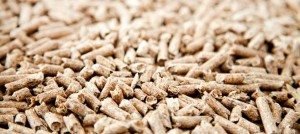Special for the Armenian Weekly
This is the last installment in a six-part series I’ve written as a volunteer with the Armenian Environmental Network in Yerevan. The goal of this project was to bring to light some of the exciting work of environmental organizations in Armenia. The country currently faces many significant environmental challenges, from deforestation and mining to conservation issues and pollution. But in visiting the organizations featured here, I’ve found a community of strong, motivated, passionate individuals committed to fighting for Armenia’s environmental future.

The last stop on my environmental tour brought me to Researchers for Bio Heating Solutions (RBHS), which was founded in 2012 with a mission to improve heating opportunities in Armenia, with a focus on rural areas without access to gas heating. The RBHS sees the potential for using biomass in heating rural homes and greenhouses, specifically through the sustainable production and burning of biomass pellets. The organization’s founder, Jan Michael Ahlin, was first exposed to the agricultural sector in the South Caucasus region while working for the Human Rights Center in Georgia. There he saw a need for the development of solid biomass for fuel. Noting Armenia’s issues with logging and deforestation, as well as excessive migration from rural areas, Ahlin saw an opportunity for biomass pellet production and use in Armenia.
According to Ahlin, Armenia has the most energy-diverse market in the Caucasus region. This is due to the fact that in addition to heating sources such as gas and electricity, biomass, including wood and manure, make up a part of the energy sector. While wood burning is unsustainable, biomass pellets may be a sustainable alternative. Pellets can be made from various materials. In Armenia, there is opportunity to produce pellets from vineyard clippings, excess straw, and energy crops, such as switchgrass, produced specifically for pellet production. When burned in the proper stove, pellets burn hotter, cleaner, and more efficiently than conventional wood fuel or manure. RBHS is still in the testing phase of pellet technology. As its name implies, the organization realizes the value of research and experimentation prior to investing in one particular solution.
While RBHS has made a long-term commitment to developing biomass pellet technology, it’s also devoted to the development of other heating solutions in rural areas of Armenia. This winter, RBHS completed construction of a passive solar greenhouse in Kut village, located in the Vardenis sub-region. The greenhouse is unique because the building techniques and materials used, as well as the orientation of the building, all help to trap and store the sun’s energy, extending the growing season while reducing the demand for heating fuel. For RBHS, this greenhouse is an incubator. It hopes it can get others interested in the idea as well as other donors on board. Its goal is to learn from the challenges encountered so far to successfully replicate 10 other greenhouses, addressing environmental issues while providing income opportunities to a border village that’s seen significant emigration.
Ahlin says, “We’re challenging the energy situation, and showing that Armenians are ready for innovative technology.”


What is the status of solar energy in Armenia? Are any solar panels available for homes in Armenia?
Good, more of this please.
Armenia’s current situation, should be an opportunity to inspire creative solutions and hopefully create local industries around these ideas. Make this something the younger generation in Armenia to tackle by applying their smarts. Maybe Tumo can help with this by creating engineering projects to tackle a challenging problem.
Heating is a critical need in Armenia and we know the impact it has on the forests.
Armenia can become an important energy supplier by extracting forest wastes (naturally fallen trees, branches, and twigs) and process them to become wood pellet. This wood pellet can be packaged and exported to other European and Asian countries as fuel for electrical power plant or for wood stove in every house.